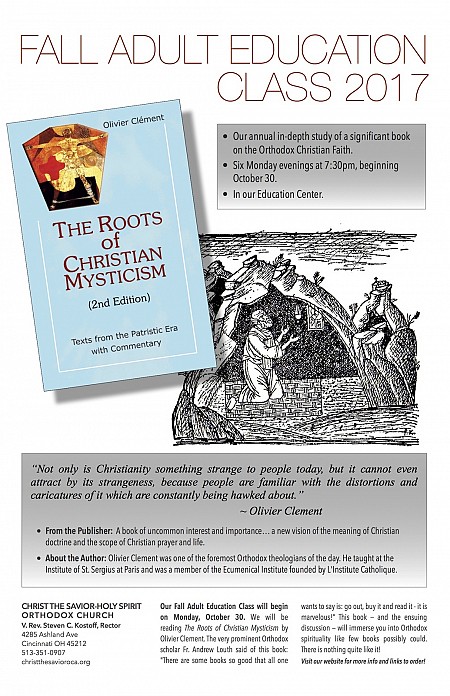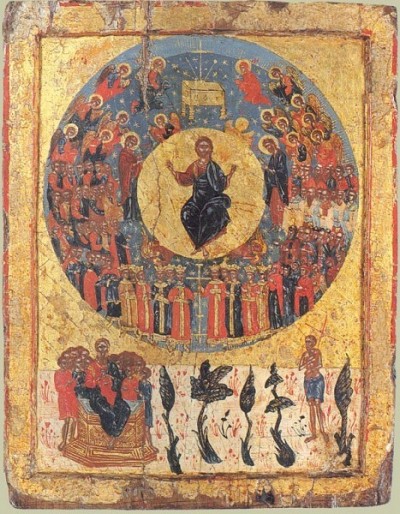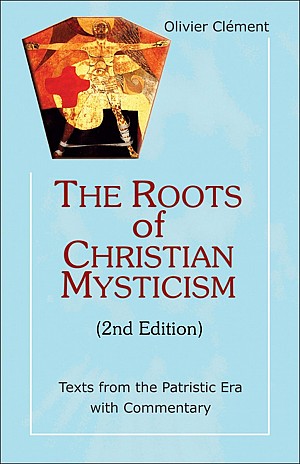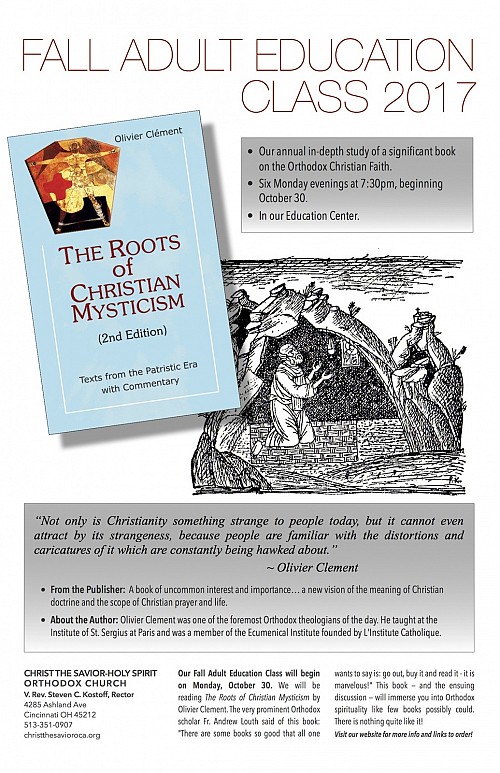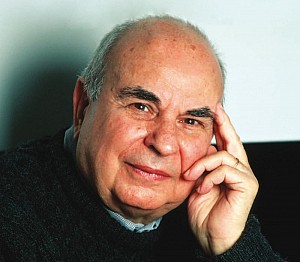"This year we will be reading The Roots of Christian Mysticism by Olivier Clement. The very prominent Orthodox scholar Fr. Andrew Louth said of this book: 'There are some books so good that all one wants to say is: go out, buy it and read it - it is marvelous!' This book - and the ensuing discussion - will immerse you into Orthodox spirituality like few books possibly could. There is nothing quite like it!"
— Fr. Steven
More info, flier, and links to order the book provided here...
We hope to see you there!
Dear Parish Faithful,
"How can we judge another person without imprisoning that person to his past acts? Without shackling him to one moment of his development?" - Olivier Clement
The Difficult Love - I have a few thought-provoking questions together with an invitation for this Monday morning, two weeks away from our Lord's Nativity:
1) Are you feeling a bit more "Christmassy" than Christ-centered at this point in the season?
2) Do you have a nagging thought in the back of your mind that the superficiality of our secular culture is beginning to overwhelm you?
3) Are you having a difficult time focusing on God and Christ?
4) Do you feel prone to the enticements of consumerism?
5) Are you therefore seeking an honorable and noble pursuit to refresh your soul?
If any of the above are true, I would like to suggest a (near) perfect solution that may bring you consolation and relief from the above-mentioned cares: Join us for the sixth and final session of this year's Fall Adult Education Class as we discuss the theme of Christian Love! How would you like to spend ninety minutes with your brothers and sisters in Christ, discussing a text such as the following:
"This is the nature of love: to the extent that we distance ourselves from the center [of the circle] and do not love God, we distance ourselves from our neighbor; but if we love God, then the nearer we draw to him in love, the more we are united with our neighbor in love."
There are many more such texts to follow in the chapter under discussion, "The Difficult Love." Bring rest to your soul from the tumult of the world and enter into the "mind of Christ" through the teaching of the great Church Fathers on love. And (unlike the world) it is free! Our Sixth and final session will meet this evening at 7:30 p.m.
- Fr Steven
Dear Parish Faithful,
Please join us for the last three sessions of our Fall Adult Education Class as we continue to discuss The Roots of Christian Mysticism. This could serve as a good use of one's time and energy as we seek to balance out the endless stream of pre-Christmas preparation that gets to be pretty consuming - and distracting. Making time for the Church is one of the challenges during this season of the "battle of the calendars." The Fathers of the Church will help keep us focused.
In Session IV we will read and discuss passages from Pt. II, ch. 2-4. The chapter on "Interior Combat" is the one I would like us to concentrate on. This chapter introduces the way into the life of the Spirit, and is probably more well-suited for us 'beginners." Clement discusses ascesis (asceticism) and the practical life of fighting against the passions, and that is what we are trying to accomplish on however modest of a level during lenten seasons.
- Therefore we will focus on pp. 130-136 in some detail, reading many of the patristic excerpts and Clement's commentary.
- Then there is the beautiful passage from St. Benedict on p.138-139, followed by Diadochus on 139-140.
- Please read the biographical notes on St. Benedict (I believe I already assigned Diadochus earlier).
- In Ch. 3 we need to at least read the incredible prayer from St. Isaac of Nineveh on p.151-152. So please read the biographical entry about St. Isaac at the back of the book.
- In Ch. 4, I want to make sure we read the final pages, 175-177, especially concentrating on the text of St. Dionysius the Areopagite on p. 176.
We have to remember, that for the most part we are reading texts from either monastics or celibate members of the clergy - bishops and priests. So, it is a challenge to "translate" their deep insights - and their intensity - into our current living conditions.
Look forward to seeing you this evening at 7:30 p.m.!
Fr. Steven
Scroll down for our class outline, notes on previous class sessions, and info on the author, as well as links to order the book.
Dear Parish Faithful,
Back to Class -
We will resume this year's Fall Adult Education Class on Monday evening, November 27, at 7:30 p.m. We have completed three sessions and we have three more sessions to go. A nice, neat division. You can treat these last three sessions as a kind of new beginning to the class and join us for some more of Olivier Clement's incredible anthology of classic texts from the great Church Fathers.
After the inevitable over-indulgence of Thanksgiving, the saints will help us "get our minds right" with the scintillating brilliance of their deep expression of the Christian life.
Come and join us - there is plenty of room. And it is free!
- Fr. Steven
Scroll down for notes on previous sessions, and info to order the book...
Dear Parish Faithful,
For those participating in Session III of our class on Monday evening, November 13:
We are now in Part II of the book, and our outline indicates that we will read and study Ch. 1 & 2 of Part II - "Ecclesia: A Place of Rebirth;" and "The Interior Combat."
However, while reading and reviewing the material, I think it best to only cover Ch. 1 this upcoming Monday. This will allow us for a longer discussion of the many texts concerning the Church, the Scriptures, Baptism and the Eucharist. Also, Ch. 2 is much closer in theme to the following Ch. 3 & 4. Since we will have two weeks of preparation time for Session IV, we will combine these three chapters for our session on November 27. (On Monday, November 20, we will serve the Vesperal Liturgy for the Feast of the Entrance of the Theotokos Into the Temple).
Again, we face the "problem" of having so many wonderful texts assembled by Clement that it is difficult to limit our choices, but we will be able to proceed a bit slower with only one chapter being covered on Monday.
In ch. 1 we will begin with the texts on the ecclesia by St. Irenaeus of Lyon. We will then focus on the texts of Origen on the Scriptures on p. 97-100; and perhaps St. Gregory the Great on p. 102-103. So, please read the biographies of these two figures in the back of the book. Origen is controversial, but he was a dedicated Christian and a brilliant thinker, surely the most brilliant of the pre-Constantinian Church.
The texts on the Baptism section will be drawn from St. Basil the Great and St. Cyril of Jerusalem.
The texts on the Eucharist are endlessly remarkable, and we will definitely read those of St. John Chrysostom and St. Justin the Martyr (so read their respective biographies). Two more texts particularly stand out: those of St. Maximus the Confessor and St. Cyprian of Carthage on p. 116-117. The text on Eucharistic practices by St. Basil the Great on p. 123 is fascinating and may surprise you if you haven't already read it.
Clement's commentary throughout is quite brilliant and he makes some very "contemporary" points about the Eucharist that resonate with our own liturgical/eucharistic renewal in today's Church. Please read his commentary carefully.
— Fr. Steven
Scroll down for our class outline, notes for previous sessions, and links to order our book...
Dear Parish Faithful,
For those who will be present at Session II on Monday evening, November 6 at 7:30 p.m.
Our outline has us covering Pt. I, ch. 4 & 5 in Session II. Both chapters are simply "loaded" with one great text after another, so choosing what to focus on is difficult, but then again it is something of a "win-win" situation.
Since Ch. 4 on "God: Unity and Difference" can at times seem abstract as did Ch. 2, my desire is to focus a bit more on Ch. 5 - and simply making sure we get there!
In Ch. 4, we will therefore concentrate on all of the extracts from St. Gregory Nazianzen (the "Theologian"). He may have been the most brilliant of the Church's trinitarian theologians.
We will also read those of St. Irenaeus of Lyons, the Church's first true "theologian." Make sure you read the biographies at the back of the book of both of these Fathers (p. 335-336 & 344-345). The commentary is very insightful throughout so hopefully everyone can read the entire chapter on one's own.
Ch. 5 on "The Human Vocation" is especially rich and evocative of the great depth and beauty of the Eastern Fathers' teaching on what it means to be human (Christian anthropology). The Eastern Fathers stressed the dignity and greatness of our human nature in an unsurpassed manner, and these texts wonderfully bring that out. Hard to make a choice! But we will especially concentrate on the texts of St. Gregory of Nyssa which are found throughout the chapter. For that reason make sure to read his biography (p. 337-339). While you are at it, might as well read the biography of St. Basil the Great and thus read up on the three Cappadocia Fathers as they are known to us today.The account of Baptism by Diadochus of Photiki on p. 90-91 is brilliant and must be read carefully.
Clement's commentary is great throughout the chapter, but make a point of carefully reading what he writes on p. 77-78; 81-82; 84-85.
Looking forward to Session II!
Fr. Steven
Dear Parish Faithful,
"God is love. Whoever sought to define him would be like a blind person trying to count the grains of sand on the sea shore." (St. John Climacus)
The following is for those who intend on participating in the class that begins next Monday evening (10/30):
The book that we will be reading is no doubt challenging, but for that very reason it is potentially very rewarding. You will finish the class with a much greater knowledge of the wisdom of the great Church Fathers - and that wisdom will deeply impress you.
I am again attaching the outline that we will follow for our six sessions. There is no way that we will be able to cover the entire book, so actually we will be selective when covering the assigned material on the outline.
The way I see it, the first session may prove to be rather rough going, primarily based on Ch. 2 "God - Hidden and Universal." This is primarily because Olivier Clement chose many of the writings of Dionysius the Areopagite for this chapter, and his writings on God can be either abstract or even obscure. I would suggest just reading through as much and as best as you can. I will do my best to explain why Clement chose Dionysius for the bulk of this chapter and the role of his writings in shaping our theology.
As I see it, I would like to concentrate on the following texts for our first session:
Both the Preface and especially the Introduction are very important, so I would like to begin there without, hopefully, failing to move on in a timely fashion..
In Ch. 1 - "Quest, Encounter and Decision," I would like to discuss in some detail the opening passage from St. Augustine (p. 15-16) and the long and extraordinary autobiographical passage from St. Hilary of Poitiers on p. 18-21. We will then choose a few more of the remaining texts on love that close out the chapter. Rereading this book, I am again appreciating how insightful and essential to the book is Clement's extensive commentary linking the various passages. Please read his commentary carefully, for often he is explaining what the Church Fathers are saying in a given passage. And he is also "contemporizing" the Fathers for the current generation.
In Ch. 2 - "God, Hidden and Universal," we will discuss the short passages on p. 26-27 and Dionysius on p. 29, and his second passage (Letter to Gaius) on p. 30. The short passage on p. 34 by St. John Climacus is also very nice.
In Ch. 3 "The God-Man" we really must be selective because there are so many rich passages. We will begin with the excerpts from St. Irenaeus on p. 36-38. We will then read the great passages of St. Gregory Nazianzus on p. 41, 43, 45. Not sure we will get any further than that.
I highly recommend the Biographical and Theological Notes beginning on p. 309. This is something like a second short book. These are succinct but often brilliant biographical outlines of the great Church Fathers that will further reveal their individuality and the contexts in which they wrote. I have learned that they can be read consecutively, as they are presented alphabetically; or simply referred to when coming to a passage from a particular Father.
At the same time, I want all of you to pick any passage that you find particularly striking and feel free to bring it up for discussion or sharing. Or, if you encounter anything confusing and would like some possible clarification - no guarantees! I am aiming more for a fruitful discussion than simple teaching on my part.
Hope you enjoy the richness of this book! Looking forward to our first session next Monday!
- Fr. Steven
The Roots of Christian Mysticism - An Outline
Note: All page number citations refer to the 2nd edition.
Scroll down for more info on our book and its author, as well as links to order...
Join Us for our
Fall Adult Education Class 2017
• Six Mondays Evenings at 7:30pm
• Beginning October 30
• In our Education Center
Looking ahead, our Fall Adult Education Class will begin on Monday, October 30. We will be reading The Roots of Christian Mysticism by Olivier Clement. This book is an inexhaustible treasury of excerpts from most of the great Church Fathers together with a brilliant running commentary by Clement. The book is basically a wonderful in-depth exploration of the greatest theological and spiritual riches found in the Church. You will be reading and discussing an endless stream of the great "classics" of the Church's living Tradition.
The very prominent Orthodox scholar Fr. Andrew Louth said of this book: "There are some books so good that all one wants to say is: go out, buy it and read it - it is marvelous!" This book - and the ensuing discussion - will immerse you into Orthodox spirituality like few books possibly could. There is nothing quite like it!
Our six-session class will begin on Monday, October 30 and continue until Monday, December 11. (We will postpone the session for 11/20 as we will have a Vesperal Liturgy that evening for the Feast of the Entrance of the Theotokos into the Temple).
Here are two links for purchasing the book. The first link is to St. Vladimir's Seminary Press. Just not sure how many copies they currently have, so I have also included the usual amazon.com link. You definitely want to make sure that you purchase the 2nd edition.
~ Fr. Steven
NEW! ADDED NOV 27, 2017
PDF version of The Roots of Christian Mysticism, 1st Ed.
* Removed 04/04/23, and PDF file deleted from website archive, per 'Request for Removal of Copyrighted Material', submitted by Matteo Poto, Focolare Media, focolaremedia.com. - RHS, webservant
Download and print our flier for our 2017 Fall Adult Education Class.
MORE ABOUT THE BOOK: (From Amazon.com)
By linking together a series of brilliantly chosen texts from the early centuries of the Church, the author lays bare the roots of the deeply mystical spirituality that has flourished among Christians throughout the ages. This book will appeal to anyone who is interested in the field of spirituality. It is a masterly contribution to Christian scholarship, and this second edition includes an extraordinarily useful Index.
There are some books so good that all one wants to say is: go out, buy it and read it - it is marvelous! And so it is with this fine translation. --Andrew Louth, Fairacres Chronicle
+++
Olivier Clement is a French Eastern Orthodox Christian theologian. He has gathered selections from the Church Fathers (and some Mothers too) by topics. Some selections are just a sentence or two, others are several paragraphs. His commentary is brief and usually helpful, but the book's real greatness is that the spirit of the Fathers is so accessible. In this book, everyone can have easy access to the spirituality of ancient Christians. There is deep theology, but also extensive practical sections on prayer and virtues. The English title is inappropriate; the French title is simply "Christian Sources." Clement does not present Christian esotericism but mainstream ancient Christian thought. --Wayne Mcdaniel
+++
"Olivier Clement sets out to uncover the deeply mystical spirituality that he suggests is neglected by many Christians today. Clement is an Orthodox theologian teaching at the Institute of St. Sergius in Paris and a member of the Ecumenical Institute founded by L'Institute Catholique. The author laments Christians sentimental fascination with anything Eastern, specifically Tao or Zen. He wants to demonstrate that what they are looking for in the spiritual practices of the religions of East Asia can be found in the Christian heritage.
"In his effort to recover the mystical sources of Christianity, Clement provides an anthology of the first Christian mystics. His selections are not arranged chronologically or alphabetically; the end result is not so much an anthology as a selection of passages with extended and lively commentaries. The pieces are arranged according to Clements theological vision, in which spiritual combat occupies a central role. The most instructive part of the work is Clements extensive treatment of different approaches to prayer and contemplation. By linking a series of texts from early Christian centuries together with his own commentaries, albeit in a sometimes disjointed way, Clement has provided a helpful contribution to all who are interested in the study of spirituality." --Michael Downey, America
BIOGRAPHY (Wikipedia)
Olivier-Maurice Clement was born on 17 November 1921, into an agnostic family from the Cevennes.
He became a follower of Jesus Christ at the age of thirty, after a long search in atheism and in Asian spiritualities. He had discovered, through reading the Christian philosophers Nicholas Berdyaev and Vladimir Lossky (of whom he would become a student and a friend), the thinking of the Fathers of the ancient, undivided Church, and he received baptism in the Orthodox Church, within the French-speaking diocese of the Moscow Patriarchate in Paris. He described his childhood, spiritual wanderings and conversion in his autobiography, L'Autre Soleil (The Other Sun) (ed. Stock 1986).
As a history professor, he taught at the Louis-le-Grand lyceum in Paris for a long time. As a professor of the St. Sergius Orthodox Theological Institute (Institut Saint-Serge) he became one of the most highly regarded witnesses to Orthodox Christianity, as well as one of the most prolific. He was a founder of the Orthodox Fellowship in Western Europe, and was the author of thirty books on the life, thought and history of the Orthodox Church, and their meeting with other Christians, the non-Christian religions and modernity. He was responsible for the theological journal, Contacts, and became a Doctor honoris causa at the Institute for theology in Bucharest and at the Catholic University in Louvain.
Within the scope of his teaching activities, Olivier Clement was particularly engaged in the life and testimony of the Orthodox Church in France. He also inspired the work of the Orthodox Fellowship in Western Europe from its founding in the early 1960s and participated in Orthodox Christian conferences in western Europe from 1971, when every third year Orthodox Christians from the four corners the continent would meet to pray and reflect together.
Among contemporary Orthodox theologians he was one who gave most attention to questions of modernity; which he sought to answer through a powerful and poetic reflection, rooted in the tradition of the Church as well as creative and renewing. He was an interlocutor with several great spiritual leaders of his time - Saint Sophrony of Maldon monastery in Britain, Patriarch Athenagoras, Pope John Paul II, theologian Dumitru Staniloae, Brother Roger of Taizé, Andrea Riccardi, founder of the Sant'Egidio community - with all of whom he formed a relationship of trust and friendship.
He died on 15 January 2009.
More including bibliography and links here...
Select Quote:
"The kenosis of the Son reveals the mystery of God who is Love. This gift of life is an extension of a mysterious exchange at the heart of the Deity. In God himself the One does not exclude the Other, it includes it. The Unity of God is so complete, so rich, that it is not solitude enclosed in itself, but rather the fullness of communion. And thereby, the source of all communion."

